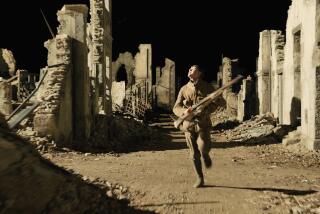First Blood
- Share via
Fred Anderson of the University of Colorado, Boulder, has given us a fresh, detailed and readable narrative of the war that Americans call the French and Indian War but was known in Europe as the Seven Years’ War. Although he neglects the war that the British and French fought in India--for in the 18th century it was a world war for empire and Robert Clive was better known than George Washington--Anderson nevertheless takes us with assurance through the swamps and snowstorms, from the rushing rivers of the Ohio Valley to the mob-filled streets of London in the reign of the German-speaking Hanoverian King George II. Anderson writes vividly of Lt. Col. Washington’s clash with Ensign Joseph Coulon de Villiers de Jumonville at Fort Necessity in 1754; of Braddock’s disaster on the Monongahela; of Louis-Joseph, marquis de Montcalm-Gozon de Saint Veran, and James Wolfe and their deaths in the Battle of Quebec, which lost France an empire; of the lives lived by the Six Nations of the Iroquois; and not least of Britain’s allies, the Mohawks. He knows when detail helps, and he is as well-informed on the House of Commons as he is on the Ohio River Valley.
He explains how this frontier war destroyed an American diplomatic system in which native people had long played the central balancing role and gave tens of thousands of American colonists their first experience of real Englishmen--and Scots, Welsh and Irish--as well as of the British culture and class system. Thus the groundwork was laid for an American generation holding a common view of the world and of the empire and being capable two decades later of rallying against the men who had once been their masters. Provincial soldiers came from everywhere in North America, and by the time the shot was heard around the world, almost everyone had military experience. At least 60,000 men had served in colonial regiments, and every fifth soldier evidently had died in uniform. All Americans had awareness of war and of war service long before 1776.
Anderson is correct when he says, “[I]f viewed not from the perspective of Boston or Philadelphia, but from Montreal or Vincennes, St. Augustine or Havana, Paris or Madrid--or for that matter Calcutta or Berlin--the Seven Years’ War was far more significant than the War of American Independence.” In its aftermath the French were driven out of North America and the Indians were only a frontier problem. The desire for revenge did drive French foreign policy in the 1780s and thereby shaped European affairs for two decades. Without the Seven Years’ War, American independence would have been long delayed and achieved (if at all) without a war of national liberation.
Anderson is not an old-fashioned imperial historian. He has already proved himself as a reporter on “A People’s Army: Massachusetts Soldiers and Society in the Seven Years’ War.” In this book, he interweaves the stories of European kings and imperial officers with those of Indians, traders and the rich mixture of varied colonial peoples; it is social and economic as well as military history, and Maria Theresa’s wish to regain her beloved Silesia and the maneuvers of Louis XV of France matter as much as the frontier struggle in the Ohio Valley. This is a story of kings and queens, diplomats and soldiers--and traders all. The War of Independence was not foreseen or wanted in 1754, but it began then with the conference at Albany for a union of the British in North America which would settle the military threat posed to them by the French and the Indians.
It is not the least of Anderson’s merits that he conveys the strongly pro-British thinking of the leading colonists in the 1750s: notably Benjamin Franklin, Thomas Hutchinson, William Shirley and, at that time, Washington. Indeed if the plans discussed at Albany in 1754 had matured, it is possible that North America would have had two new British colonies in the Ohio country by the 1760s and that the notion of independence would never have arisen. That is a subject that perhaps it is heresy to raise after two centuries of independence, especially in light of the story of the most successful and most prosperous democracy in the world’s history.
It should be added that Anderson attests his professionalism by citing 100 pages of notes on his sources, which are wide-ranging, vivid and varied and realistic. And if he has a hero, it is Washington, on whom he writes with special fervor. “I have a Constitution hardy enough to encounter and undergo the most severe tryals,” Washington wrote to his commander, Gov. Dinwiddie, on the day after his first encounter with the French, but he also admitted that he “most ardently wish’d” to be “under the Command of an experienced Officer.”
Anderson writes also as a realist: In the first frontier clash of French and British, as in most wars, there are as many wounds as deaths. The clash at Great Meadows was largely an accident. But even in his early and inexperienced days as a soldier, Washington already had a reputation that he was careful not to put at risk. His later career reveals the same caution--but then that is as true today of our largely self-appointed leaders in war as in peace in the United States, in Europe and in the United Kingdom.


